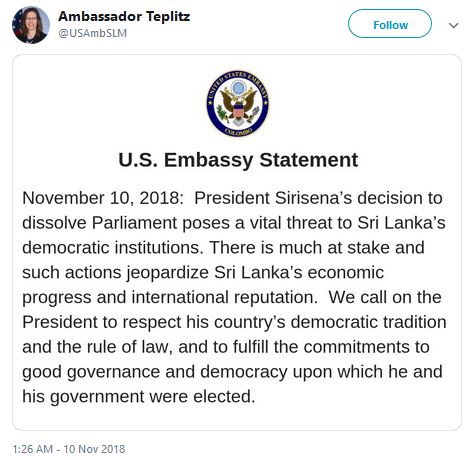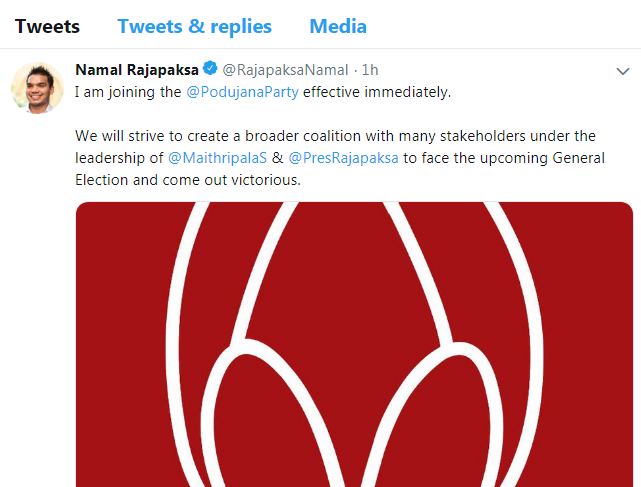News
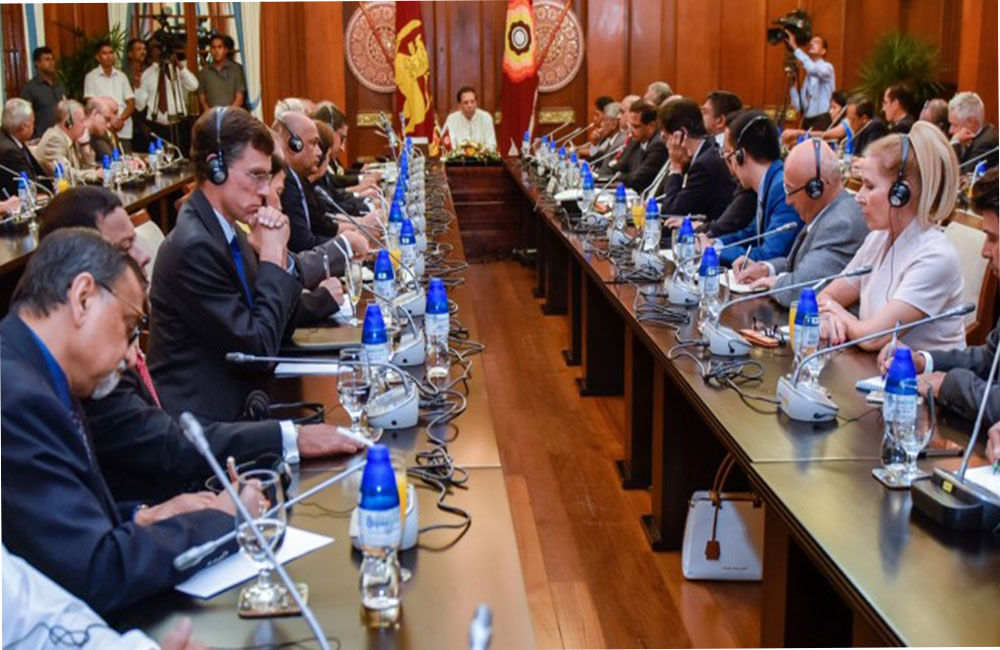
Foreign envoys to be at the Supreme Court on Monday
In the backdrop of the sudden unconstitutional dissolution of parliament by president Maithripala Sirisena, it is reported that foreign envoys in Colombo are planning to visit the Supreme Court on Monday (12), diplomatic sources say.
The United National Party (UNP), Tamil National Alliance (TNA), Janatha Vimukthi Peramuna (JVP), Sri Lanka Muslim Congress (SLMC), All Ceylon Makkal Congress (ACMC) as well as other allied parties of the United National Front, have all decided to challenge Sirisena's unconstitutional dissolution by filing a petition at the Supreme Court on the 12th of November.
Sirisena dissolved parliament on Friday night (09), only five days before it was due to be reconvened, amidst the real possibility of losing a vote of no confidence. He has also called a general election for January 5.
The president triggered an intense power struggle when he sacked prime minister Ranil Wickremesinghe and appointed Mahinda Rajapaksa, a pro-China strongman ousted by Sirisena in 2015, in his place.
UN chief Antonio Guterres has expressed grave concern over President Sirisena’s decision to dissolve the nation’s Parliament, underlining the “utmost importance” of respecting democratic processes and resolving differences in accordance with the rule of law.
Furthermore, The United States yesterday called on the president to “respect his country's democratic tradition and the rule of law and to fulfil the commitments to good governance and democracy upon which he and his government were elected.”
The European Union warned Sri Lanka that the prevailing political crisis could further delay and damage the island’s international reputation and deter investors.
“We consider it essential that Parliament be allowed to demonstrate its confidence by voting immediately when reconvened, in order to resolve the serious uncertainties currently facing the country,” the EU said.
Canada’s foreign policy twitter feed said that it was “deeply concerned” about the decision and referred to the risks to reconciliation work after the nation’s civil war.
Australian Minister of Foreign Affairs Marise Payne expressed both concern and disappointment in a statement, saying the move “undermines Sri Lanka‘s long democratic tradition and poses a risk to its stability and prosperity.”
Independent legal experts stress that parliament can only be dissolved in early 2020, which would be four-and-half-years from the first sitting of the current parliament. The only other legal way would be through a referendum, or with the consent of two-thirds of legislators.
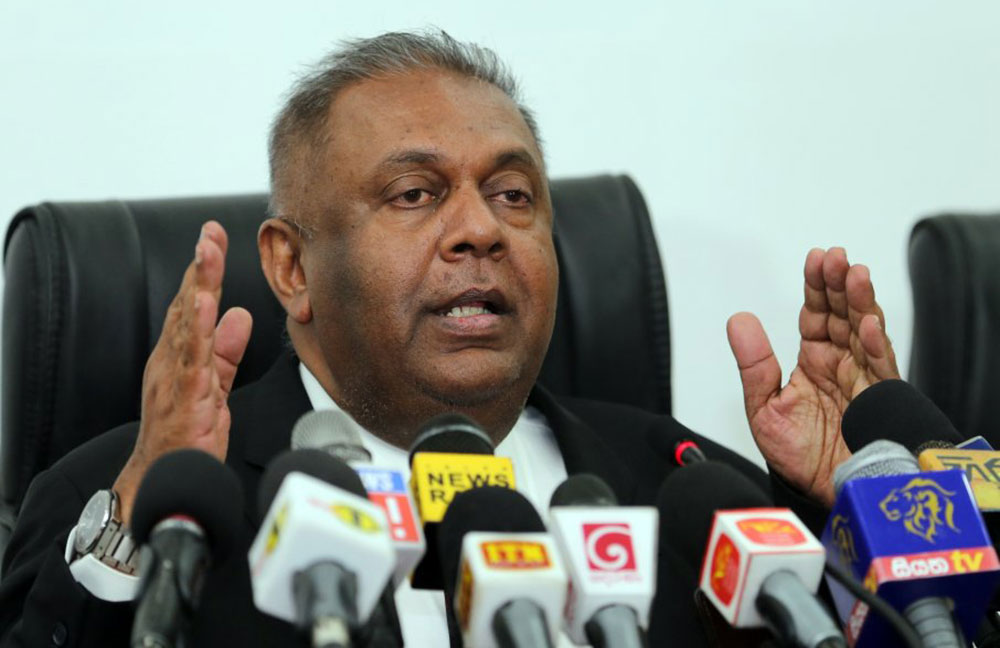
UNP to fight dissolution of Parliament in court (Video)
The United National Party (UNP) said that they will challenge in court what it termed as the illegal dissolution of Parliament by president Maithripala Sirisena, a day after he announced a snap election in January.
"We will fight this emerging tyranny of Maithripala Sirisena in the courts, we will fight in parliament and we will fight at the polls", Mangala Samaraweerasaid at a press briefing held at the Temple Tress today (10).
The UNP will be pursuing the intervention of the courts to ensure the rule of law and the Constitution is protected against autocratic moves.
Samaraweera, who played an integral part in Sirisena's election campaign in 2015, said that the UNP had supported Sirisena to come to power hoping he would be a benevolent leader like Nelson Mandela of South Africa, but that he had shown himself to be a tyrant instead.
"Sirisena came to power promising to be a Mandela, but we ended up getting a Mugabe, a mad man," Samaraweera said, referring to Zimbabwe's strongman former president Robert Mugabe.
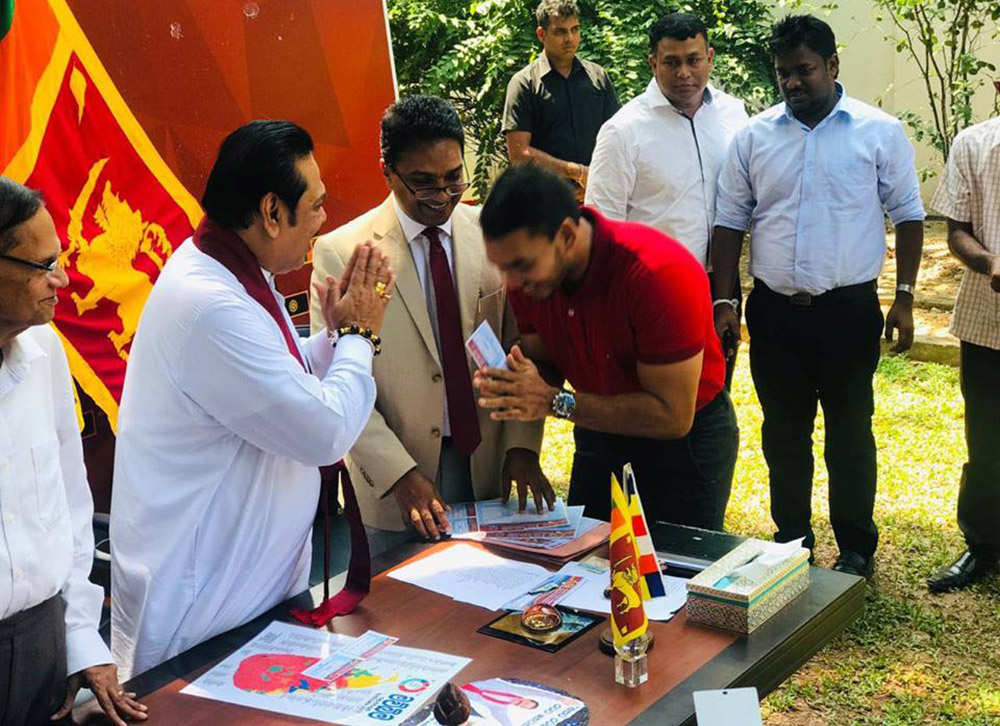
SLFP crisis deepens as Mahinda joins SLPP
Mahinda Rajapaksa, who has been a member of the Sri Lanka Freedom Party (SLFP) for over four decades, in addition to leading the party for a period of ten years, has reportedly joined the Sri Lanka Podujana Permuna (SLPP). The former president had obtained membership at his Wijerama residence today.
It is also reported that around 50 members of the Sri Lanka Freedom Party (SLFP), including those from the Group of 16, have joined the SLPP.
Several former MPs including Namal Rajapaksa, Shehan Semasinghe, D.V. Chanaka and Kanchana Wijesekara announced their decision to contest the next general election under the SLPP via Twitter yesterday.
It is also reported that president Maithripala Sirisena had sent an emissary, a newly appointed cabinet minister, to meet Rajapaksa at his Wijerama residence today.
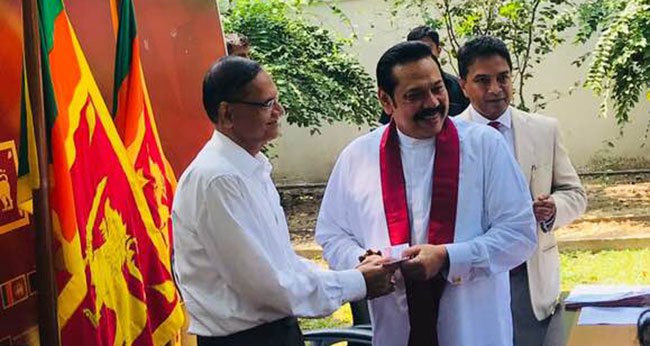
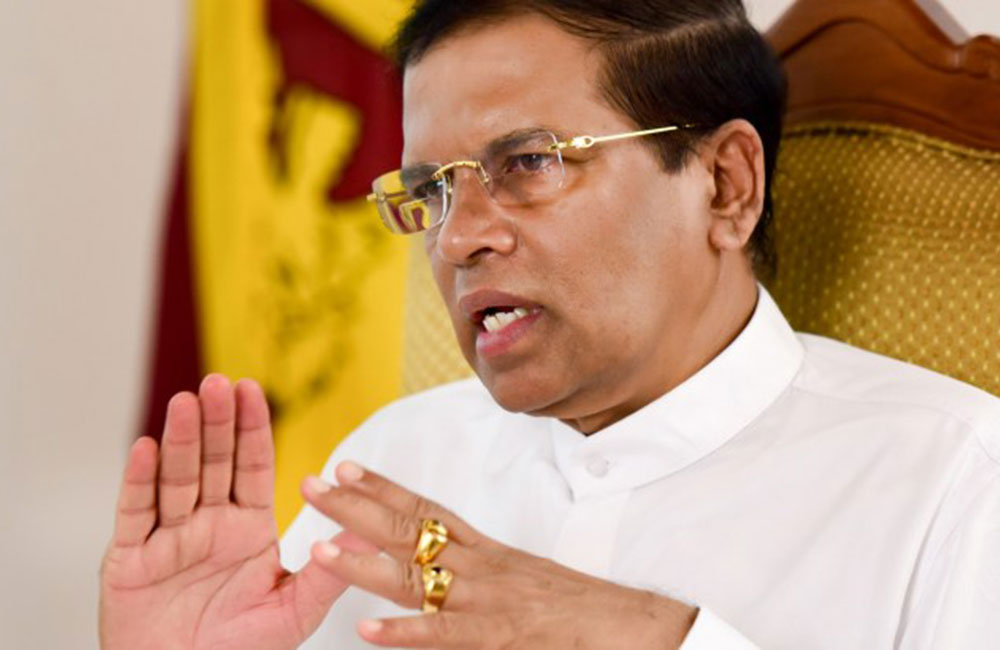
USA, UK and others denounce dissolution of Parliament as 'undemocratic'
President Maithripala Sirisena’s decision to dissolve parliament, worsening an already major political crisis, has drawn criticism from Western powers, including the US and Britain.
Sirisena dissolved parliament on Friday night, only five days before it was due to reconvene and he was in danger of losing a vote of no confidence. He has also called a general election for January 5.
The president triggered an intense power struggle when he sacked prime minister Ranil Wickremesinghe late last month and appointed the island’s former leader, Mahinda Rajapaksa, a pro-China strongman ousted by Sirisena in 2015, in his place.
Sirisena’s rivals are set to challenge his decision, which they describe as illegal and unconstitutional, in the Supreme Court on Monday.
The US Ambassador in Colombo said in a tweet that “President Sirisena's decision to dissolve Parliament poses a vital threat to Sri Lanka's democratic institutions. We call on the president to respect his country's democratic tradition and the rule of law and to fulfil the commitments to good governance and democracy upon which he and his government were elected."
Mark Field, the British minister of state for Asia and the Pacific, tweeted his concern about the dissolution of parliament days before it was due to be reconvened.
“As a friend of Sri Lanka, the UK calls on all parties to uphold the constitution and respect democratic institutions and processes,” Field said.
Canada’s foreign policy twitter feed said that it was “deeply concerned” about the decision and referred to the risks to reconciliation work after the nation’s civil war.
“This further political uncertainty is corrosive to Sri Lanka’s democratic future and its commitments on reconciliation and accountability,” it said.
Australian minister for foreign affairs Marise Payne expressed both concern and disappointment in a statement, saying the move “undermines Sri Lanka‘s long democratic tradition and poses a risk to its stability and prosperity”.
Sirisena has said he fired Wickremesinghe because the prime minister was trying to implement “a new, extreme liberal political concept by giving more priority for foreign policies and neglecting the local people’s sentiment”.
India and the West have raised concerns over Rajapaksa’s close ties with China. Beijing loaned Sri Lanka billions of dollars for infrastructure projects when Rajapaksa was president between 2005-2015, putting the country deep into debt.
Wickremesinghe refused to vacate the official prime minister’s residence saying he was the prime minister and had a parliamentary majority.
Before he signed the papers dissolving parliament and calling the election, Sirisena appointed allies of his and of Rajapaksa to cabinet positions.
Independent legal experts have told Reuters that parliament could be dissolved only in early 2020, which would be four-and-half-years from the first sitting of the current parliament. The only other legal way would be through a referendum, or with the consent of two-thirds of lawmakers.
Given those views, it was not immediately clear how Sirisena is on legal safe ground by dissolving parliament, though his legal experts have said there are provisions for him to do so.
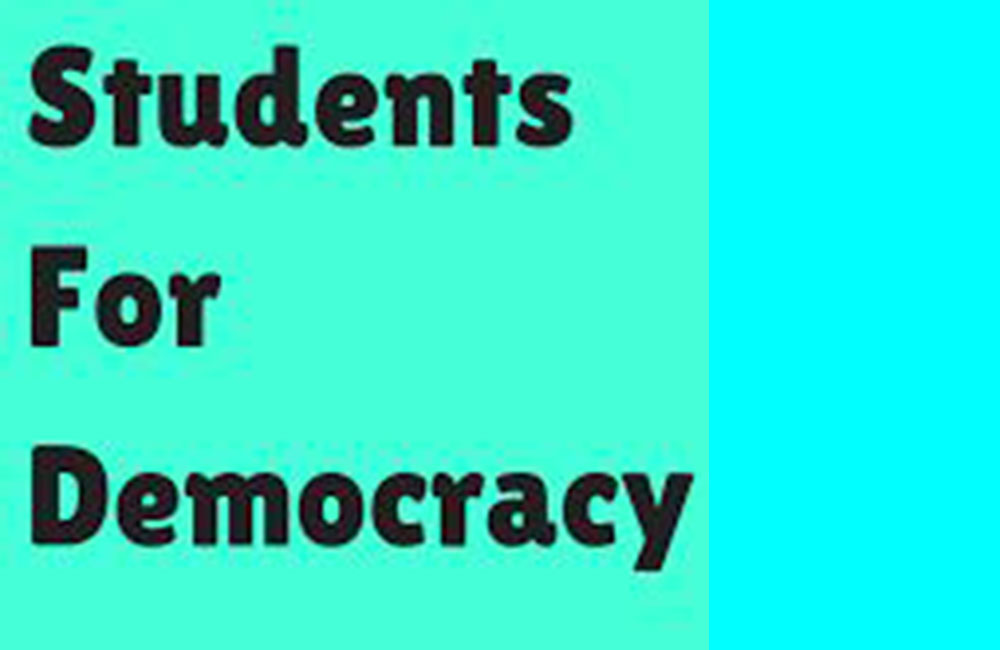
#NoConstitution = #NoDemocracy: A Statement by 900 Sri Lankan Students
The first unconstitutional transfer of power in Sri Lanka’s post-independence history occurred two weeks ago. On the 9th of November, the constitution was breached yet again in an attempt to consolidate that coup. President Sirisena signed an illegal proclamation to dissolve Parliament. In response, today, we sign this statement knowing that it is our actions, and those of our fellow citizens, that will determine Sri Lanka’s fate and our future at this fateful moment in history.
Mr. Sirisena’s proclamation is the latest in a series of unconstitutional acts. A President can only dissolve Parliament if one of two conditions are satisfied: either four and a half years must pass since the last election or 2/3rds of the Members of Parliament (MPs) must agree to dissolve Parliament. Neither condition was met: Mr. Sirisena and Mr. Rajapaksa are now acting in complete disregard of the supreme law of the land.
Yet our Constitution is not merely ink on paper. It decides how we delegate our power to our representatives. It defines the powers of the executive, the legislature and the judiciary and places checks on those powers. It fixes the rules that keep elections free and fair. In short, our Constitution is what makes democracy possible.
Claiming that a dissolution will protect democracy because it “allows the people to decide”, is a lie. Mr. Sirisena and Mr. Rajapaksa do not care for democracy. The foundation of our democracy, the Constitution, provides that only an MP who commands the confidence of a majority in Parliament can be Prime Minister. Yet, lacking a majority, Mr. Sirisena attempted to appoint Mr. Rajapaksa as Prime Minister. A democratic vote in Parliament could have demonstrated this – but Mr. Sirisena prorogued the people’s assembly to prevent one. Democracy requires MPs to represent the interests of those who elected them – yet Mr. Sirisena and Mr. Rajapaksa’s supporters used money and offers of ministries to bribe MPs into changing sides.
In two weeks, Mr. Sirisena and Mr. Rajapaksa have acted solely to consolidate their power, not to serve the People. Any election will be run on the same principle: state resources, under illegal ministers, will be used to support their campaign; state officers will be used to obstruct and weaken opposition parties; the Elections Commission will face pressure to follow orders. The media is already being muzzled. Indeed, given their complete disregard of the Constitution and democratic norms, there is no guarantee that they will accept defeat even if they lose an election. Our opposition, however, is not to elections. It is to an unconstitutional election held in a climate where the set of rules that make elections free and fair, that is the Constitution, is violated and ignored.
Therefore, we call upon:
1. President Sirisena to rescind his unconstitutional gazette.
2. The Speaker to convene Parliament immediately and hold a vote of confidence.
3. Members of the Election Commission – Mahinda Deshapriya, N. J. Abeysekera PC and Prof. Ratnajeevan Hoole - to act in accordance with the Constitution.
4. The Supreme Court and other courts to uphold the Constitution with impartiality and courage.
5. All public servants, including the armed forces and police, to only follow constitutional and lawful instructions issued in writing.
As over 900 young Sri Lankans, we will have to live with the consequence of this crisis long after Mr. Sirisena and Mr. Rajapaksa are gone. Without government by law, there is no hope of stopping corruption, nepotism and blatant violations of human rights. Without government by law, there is no chance of justice and reconciliation. Without government by law, there can be no development and prosperity for all.
Yet there is hope. Vigorous democratic resistance to the October 26th coup prevented a complete take-over. Our voices of dissent, our presence at protests, our acts of resistance – small and insignificant though they may seem – do make a difference. In this crisis we urge all Sri Lankans to join us, to take responsibility for our flawed democracy, to speak out, protest and resist, and to stand up against this grave threat to our future.
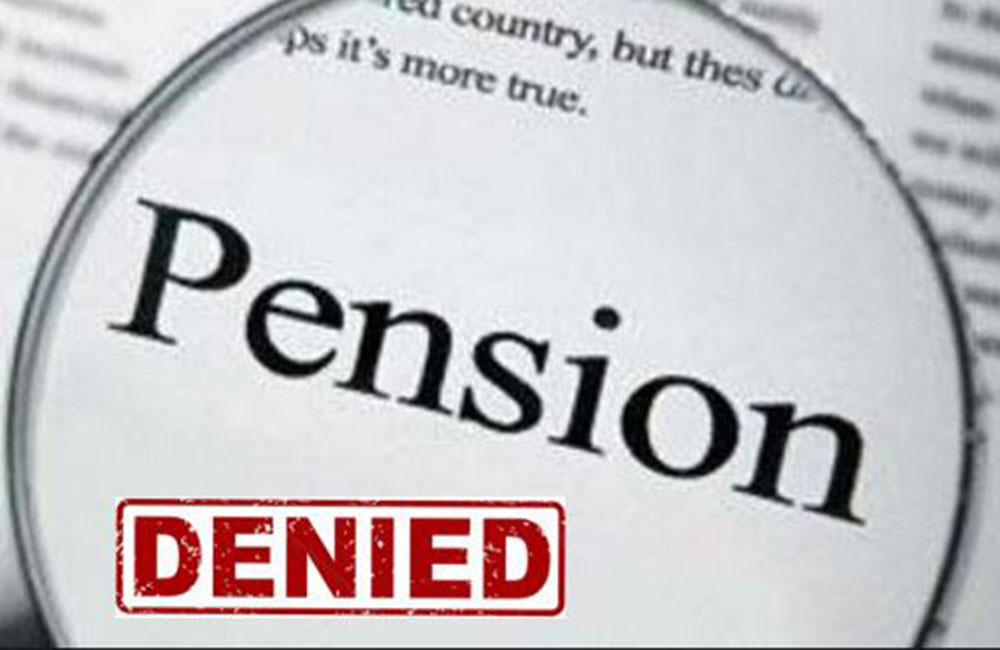
58 MPs sent into early retirement; lose pensions
The Parliament Pensions Law provides for a pension scheme for MPs who have served the legislature for certain period, in this case, a period of five years.
The sudden decision taken by president Maithripala Sirisena to dissolve parliament yesterday will result in 58 Members of Parliament losing their pensions.
Accordingly, the following MPs will not be eligible to receive a pension as they have not completed five years after the placement of the 08th Parliament.
Former Chancellor of the University of Peradeniya, Prof. M. O. A. de Zoysa revealed in May that 94 MPs have not passed their GEC (O/L) examination with only 25 graduates among the 225 legislators in the former Sri Lankan Parliament.
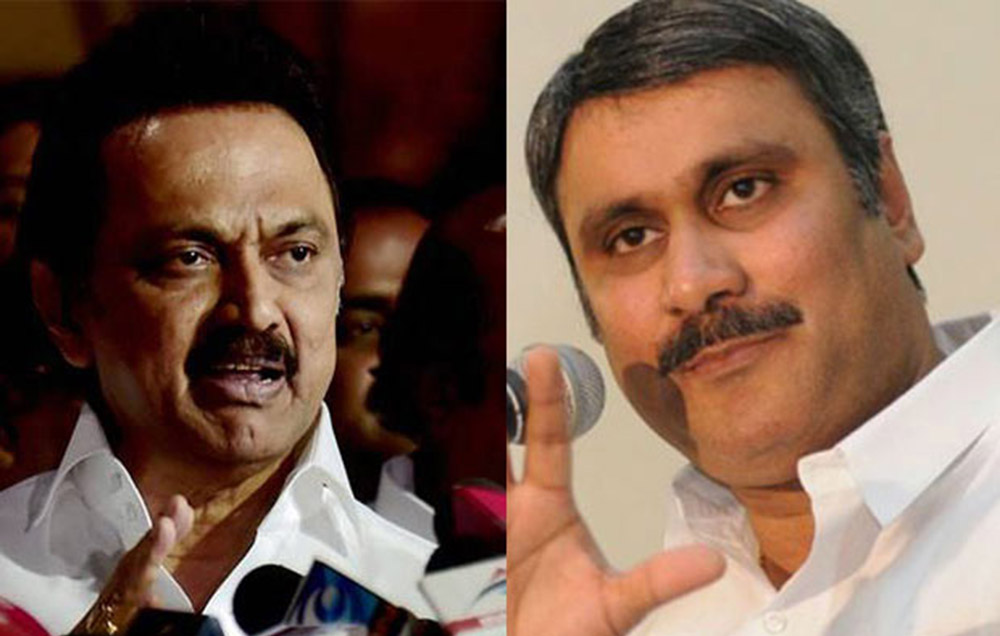
Tamil Nadu leaders condemn Sri Lanka Parliament dissolution
Tamil Nadu political leaders on Saturday condemned the dissolution of Sri Lanka's parliament by President Maithripala Sirisena and urged the centre to take necessary steps for the protection of Tamils in the island nation.
In a statement, DMK President MK Stalin said Sirisena's action was "murder of democracy".
"The Indian government instead of watching this silently should condemn the action and also take necessary steps to protect the Eelam Tamils," Mr Stalin said.
PMK leader Anbumani Ramadoss said India cannot remain quiet over the developments in Sri Lanka as it impacts the former's security and also the welfare of Tamils there.
Mr Ramadoss said the Sri Lankan elections will not be held in an honest manner.
On Friday night, Mr Sirisena announced that parliament would stand dissolved from Saturday 12 a.m. and nominations for the parliamentary elections slated for January 5, 2019, would be called from November 19 to 26.
He set January 17 as the date for the new parliament to convene.
The move comes after the President sacked Prime Minister Ranil Wickremesinghe and appointed former president Mahinda Rajapakse to the post on October 26.
Mr Sirisena made the move after his United People's Freedom Alliance quit the national unity government which it had formed with Wickremesinghe's United National Party.
Mr Rajapakse has welcomed the President's decision to dissolve parliament, saying a parliamentary election "will truly establish the will of the people and make way for a stable country".
(NDTV)
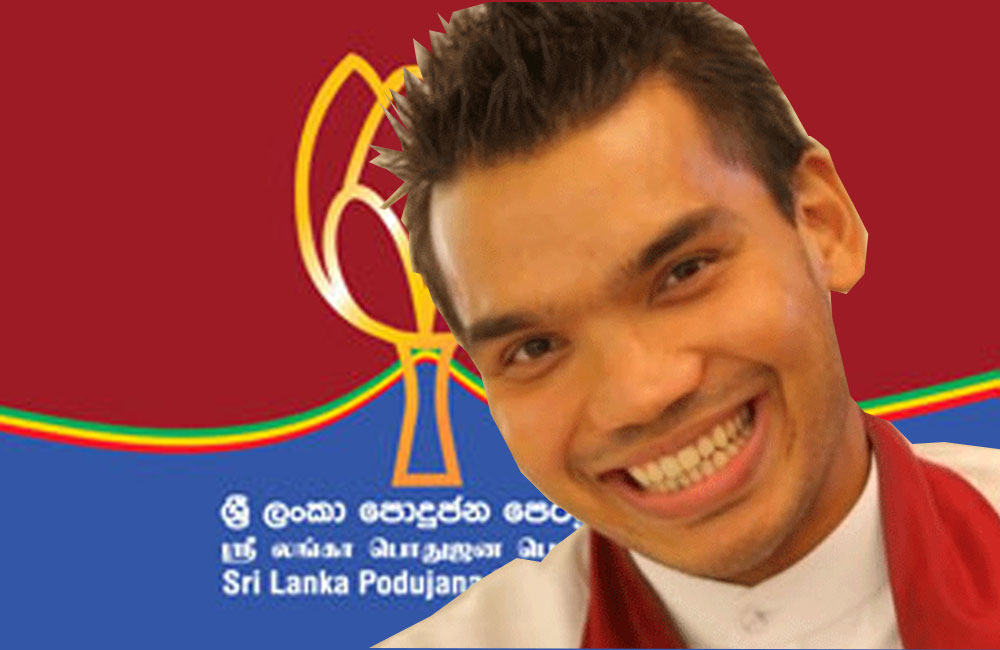
Namal leaves SLFP for ''Pohottuwa'
Parliamentarian Namal Rajapaksa has left the Sri Lanka Freedom Party (SLFP) and joined the Sri Lanka Podujana Peramuna (SLPP) with immediate effect.
In a twitter message, the son of the former president stated that “we will strive to create a broader coalition with many stakeholders under the leadership of Maithripala Sirisena and Mahinda Rajapaksa to face the upcoming General Election.”
Meanwhile, political sources have said that the SLFP is faced with a serious crisis with the unconstitutional decision taken by the president dissolve the parliament.
SLPP General Secretary Sagara Kariyawasam had stated that any future election will be strictly contested under the Pohottuwa symbol. Many SLFP organisers have come to the realisation that they will be left out from nominations to make way for their Pohuttuwa counterparts.
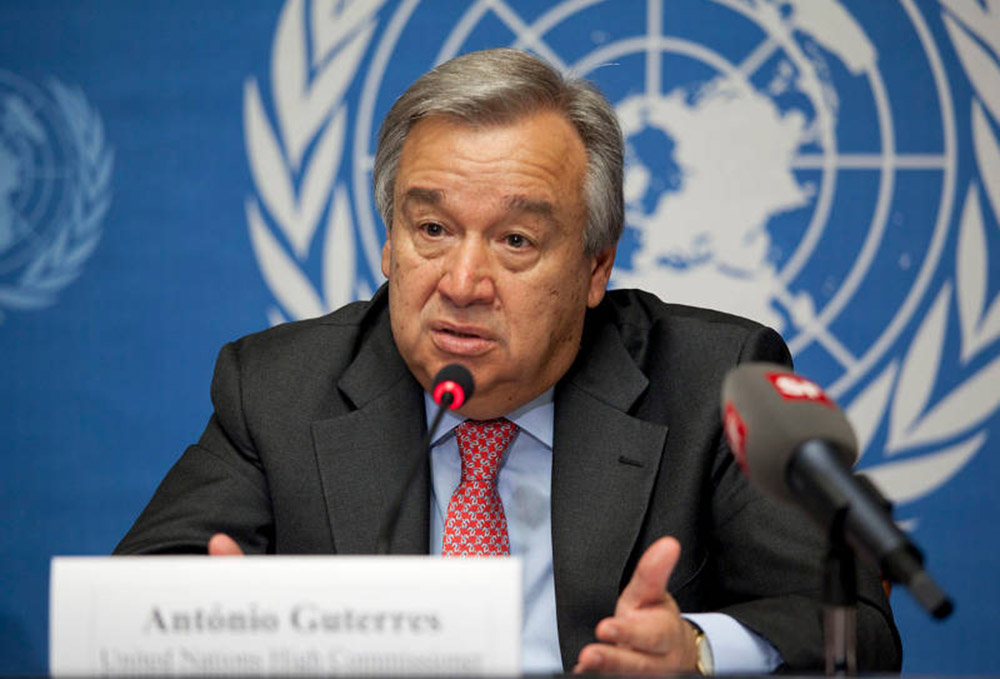
UN chief expresses concern over Sri Lankan President’s decision to dissolve Parliament
UN chief Antonio Guterres has expressed concern over Sri Lankan President Maithripala Sirisena’s decision to dissolve the nation’s Parliament, underlining the “utmost importance” of respecting democratic processes and resolving differences in accordance with the rule of law.
Sri Lanka’s political crisis deepened Friday as President Sirisena dissolved the Parliament and announced snap polls on January 5 after it became evident that he did not have enough support in the House for Prime Minister Mahinda Rajapaksa, who was appointed by him under controversial circumstances.
The Secretary-General “learned with concern” Sirisena’s decision to dissolve Sri Lanka’s parliament and move to new parliamentary elections, a statement issued on Saturday by Secretary-General Guterres’ Deputy Spokesman Farhan Haq said.
Guterres underlined the “utmost importance of respecting democratic processes and institutions and resolving differences in accordance with the rule of law and due process.” He renewed his call on the Sri Lankan government to ensure peace and safety for all the countrymen and uphold its commitments to human rights, justice and reconciliation.
Sri Lanka was plunged into a political crisis after Sirisena sacked Prime Minister Ranil Wickremesinghe on October 26 and replaced him with former president Rajapaksa.
Wickremesinghe, who dubbed the move as a “constitutional coup”, has refused to vacate his official residence, saying he is the lawful prime minister and that the president has no constitutional right to replace him.
Amid the ongoing political tensions in Sri Lanka, Resident Coordinator in Sri Lanka Hanaa Singer last month met the Speaker of Parliament Karu Jayasuriya stressing Guterres’ message for the need to respect democratic values and constitutional provisions.
Guterres earlier said he was following Sri Lanka’s deepening political crisis with “great concern” and called on the nation’s government to respect democratic values and constitutional process.
President Sirisena signed a gazette notification to dissolve the nation’s parliament with effect from Friday midnight.
According to the gazette notice, nominations to contest the snap election would be taken between November 19 and 26. The election will be held January 5 and the new parliament would be convened on January 17.
Sirisena issued the gazette noticing that the parliament stands dissolved some 21 months ahead of its schedule in August 2020.

Australia disappointed with Sri Lanka president
The Australian government has expressed "concern and disappointment" with Sri Lanka's President Maithripala Sirisena and his decision to dissolve the nation's parliament.
The president, who dissolved parliament on Friday, has called for fresh elections amid a deepening political crisis.
Foreign Affairs Minister Marise Payne issued a statement on Saturday questioning the president's move.
"As a longstanding friend, we believe this action undermines Sri Lanka's long democratic tradition and poses a risk to its stability and prosperity," Ms Payne said.
"We urge respect for the country's democratic institutions and for all parties to continue to exercise restraint."
A government notification signed by Sirisena announced the dissolution of parliament effective at midnight on Friday.
The notice said the election will be held on January 5 and the new parliament is to be convened on January 17.
Sri Lanka has been in a political crisis since October 26 when Sirisena fired his prime minister, Ranil Wickremesinghe, and replaced him with former strongman Mahinda Rajapaksa.
Wickremesinghe insists his firing is unconstitutional and he' demanded parliament be summoned to prove he has support among its members.
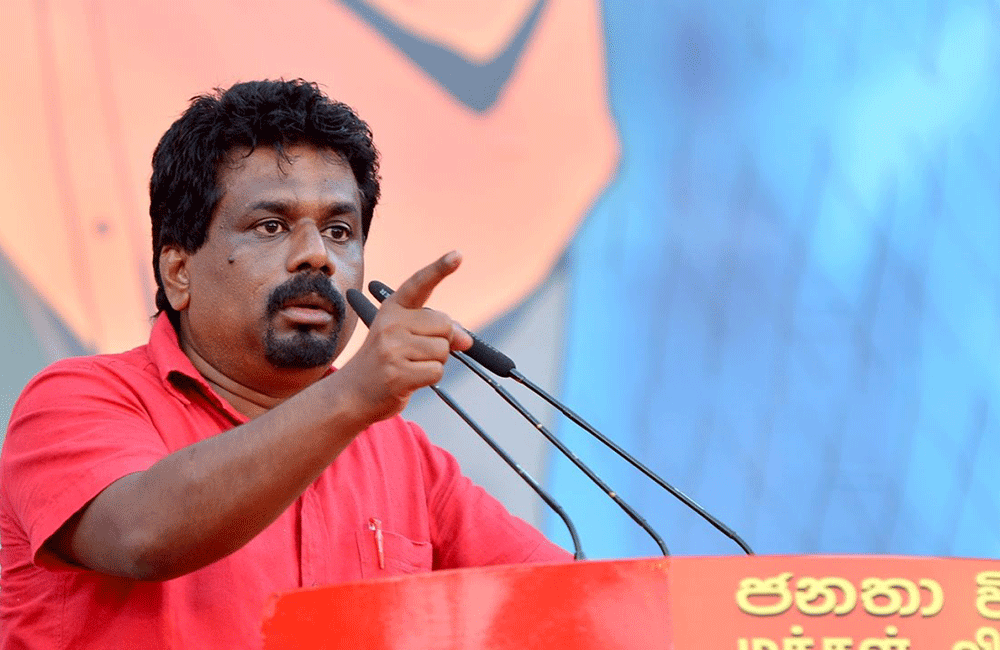
Sirisena acting like Hanuman; will fight illegal dissolution of Parliament in court - Anura
The Janatha Vimukthi Peramuna (JVP) said that they have decided to go to Court against the dissolution of Parliament, by toppling a government that was in power illegally, in a conspiratorial manner against the Constitution by President Maithripala Sirisena.
They have also decided to request Elections Commissioner Mahinda Deshapriya not to intervene to hold these illegal elections which have been called for, until the verdict from the Supreme Court is received.
They pointed out further that they expect a decision on the legality of the government that will be appointed at the next elections, through this Court verdict.
The JVP also pointed out that they are against providing a wrong precedent for the future by recognizing an act against the Constitution.
“The President is setting fire everywhere similar to Hanuma having taken the flare into his hand,” the JVP Leader Anura Dissanayake alleged at a media briefing held yesterday.
“The legal structure related to changing governments in this country has been set up by the Constitution. A government can be changed through a legal election or a vote in Parliament. However what happened on 26 October was neither of these. Sirisena and Mahinda Rajapaksa got together and said ‘you are the Prime Minister, I am the President’ and in a conspiratorial manner established a government. As an extension of that conspiracy they prorogued Parliament. Then they threw billions of rupees around on behalf of buying Ministers and MPs to build up their majority. They did that and although they attempted to carry on the administration as a small gang, the Speaker said it was required to find out who had the majority in Parliament. But, when they realized that they do not have a majority, as the final step they took on authority which was not in the Constitution and dissolved Parliament,” he said.
He did not consider the fact that powers of the Executive Presidency have been restricted through the 19 Amendment to the Constitution, and to ensure that they could use maximum state power at the elections, the President assigned the Police Department and the Government Press under him, the JVP leader said.
“For the first time in history, the President appointed Ministers in 10 rounds. That was while he had on one side a paper to be signed for the dissolution of Parliament. He did both of these things at once. We have to immediately halt this rebellious nonsense of his. Such things happen only in a monarchy,” he further said.
He emphasized further that they will therefore, engage in a strong battle against breaking up the country, the country’s overall legal system and tradition for the existence of a single individual, by the President.
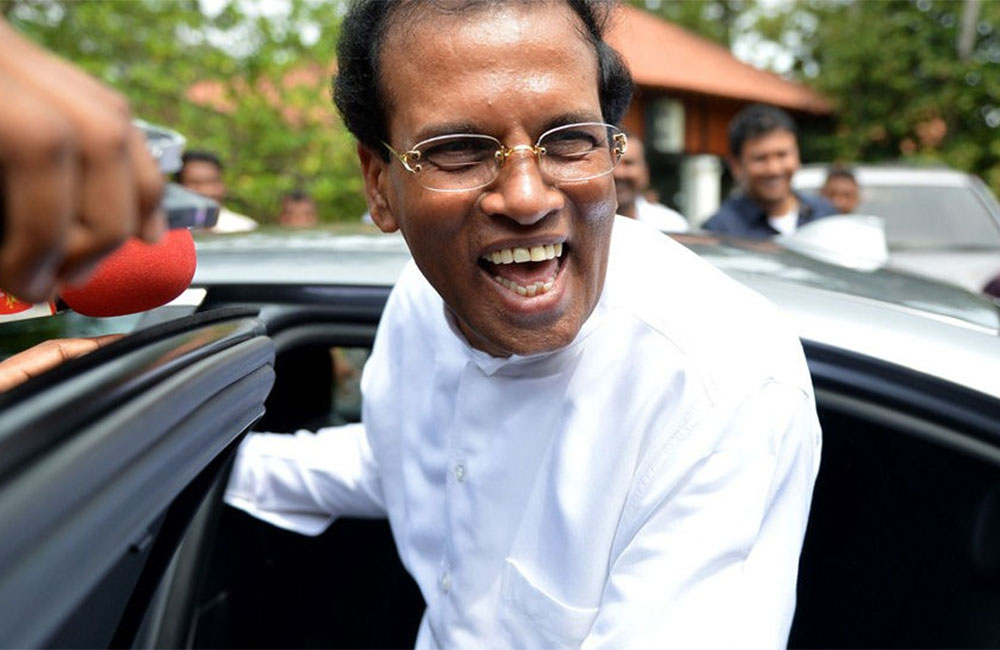
Sirisena Dissolves Parliament In Stark Violation Of Constitution
President Maithripala Sirisena has dissolved Parliament, a short while ago, in stark violation of the country’s constitution.
Sirisena, when he signed the gazette announcing the premature dissolution of the legislature, grossly violated the provisions of the 19th Amendment to the constitution – which he architected in April 2015.
Strong arguments have been presented against the dissolution of Parliament saying the President has no constitutional power to do so, before four and a half years into a Parliamentary term, as stipulated by the 19th Amendment.
Commenting on the grotesque illegality of a premature dissolution of Parliament, UNP Parliamentarian Dr. Jayampathy Wickramaratne PC, a co-author of the 19th Amendment said, “The Nineteenth Amendment, which was passed with just one Member of Parliament opposing it, reduced the term of Parliament to five years. Provisions that Supreme Court held required a Referendum were amended or dropped. Article 70 of the amended Constitution restricted the power of the President to dissolve Parliament. It now provides that “the President shall not dissolve Parliament until the expiration of a period of not less than four years and six months from the date appointed for its first meeting, unless Parliament requests the President to do so by a resolution passed by not less than two-thirds of the whole number of Members (including those not present), voting in its favour.” Thus, Parliament can now be dissolved by the President in the first four and a half of years of its term only if 150 Members of Parliament so request by a resolution passed in Parliament. The wording is clear and unambiguous.
Those who argue that the President’s power to dissolve Parliament is unlimited point out to Article 33 (2) (a) which states: “In addition to the powers, duties and functions expressly conferred or imposed on, or assigned to the President by the Constitution or other written law, the President shall have the power–
(a) …..
(c) to summon, prorogue and dissolve Parliament…”.
It is argued that Article 33 (2) (a) overrides Article 70. Article 33 only declares some of the general powers of the President. The manner in which and the conditions under which that power of dissolution can be used are given in Article 70. That Article states that dissolution shall be by Proclamation. Then it goes on set down the clear limitation that the President cannot dissolve for four and a half of years unless Parliament so requests by a two-thirds majority. Any power that the President claims under Article 33 (2) must not be in violation of express provisions of the Constitution. The words “In addition to the powers, duties and functions expressly conferred or imposed on, or assigned to the President by the Constitution or other written law…” cannot be used to override expressly laid down constitutional limitations on the powers of the President.
Take Article 33 (2) which provides in sub-paragraph (f) that the President has the power “to keep the Public Seal of the Republic, and to make and execute under the Public Seal, the acts of appointment of the Prime Minister and other Ministers of the Cabinet of Ministers, the Chief Justice and other judges of the Supreme Court, the President of the Court of Appeal and other judges of the Court of Appeal, and such grants and dispositions of lands and other immovable property vested in the Republic as the President is by law required or empowered to do, and to use the Public Seal for sealing all things whatsoever that shall pass that Seal…”
Meanwhile, addressing a lawyers’ gathering at New Town Hall, in Colombo, this afternoon, TNA Parliamentarian M.A. Sumanthiran PC said, Parliament cannot be prorogued or dissolved due to the whims and fancies of one individual.
“The Constitution is clear on Parliament being the place to decide who is PM but Parliament is prevented from doing so,” he added. (Colombo Telegraph)
Page 367 of 510
